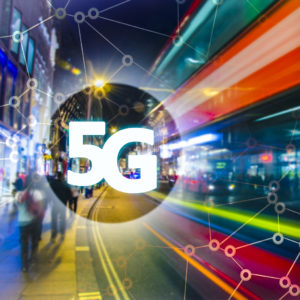Telecom companies are beginning to overhaul their networks with the fifth generation of wireless infrastructure, known as 5G. In early April, Verizon Wireless launched America’s first commercial 5G network in Chicago and Minneapolis, offering markedly improved speeds compared to existing 4G networks—up to 1 gigabit per second. Large-scale domestic deployment of 5G will take many years and hundreds of billions of dollars of private sector investment. But for 5G to realize its full potential, the government must get out of the way.
To that end, Ajit Pai, Chairman of the Federal Communications Commission, has spearheaded an effort at the agency to get rid of onerous regulations and barriers to building wireless infrastructure across the nation. By cutting red tape, the FCC hopes to make it less complicated and more affordable for telecom companies to build out 5G infrastructure. For 5G networks to succeed, providers will need to blanket the country with potentially millions of new cell sites that are packed together far more closely than existing fourth-generation cellular towers. But building these new sites means dealing with regulations imposed by towns, counties, and states—on top of federal rules.
Navigating this dense thicket of laws and rules can be so costly that building 5G networks no longer makes economic sense for telecom providers. When Verizon expanded its network in five cities in 2017 with numerous small cell cites, for instance, complying with just two federal laws amounted to 26 percent of the project’s cost. The FCC has sought to ease this burden by limiting how regulations that might make sense for large towers can be applied to small cell sites. The agency is also trying to ensure that environmental and historic preservation laws don’t unduly restrict 5G deployment. And the FCC is working to free up the airwaves—also known as spectrum—over which mobile data transmissions flow between devices and cell sites.
Some state and local government entities might prefer not to listen to the FCC when it comes to cell tower rules. But the Constitution tasks the federal government—and, in particular, Congress—with overseeing interstate commerce. Congress, in turn, has delegated to the FCC the power to regulate certain aspects of interstate telecommunications. Although courts haven’t always hewed to the original public meaning of the Commerce Clause, mobile broadband networks fall squarely within Congress’s power to regulate commerce among the states. Federal efforts to create regularity across state lines with respect to cell site regulations are therefore consistent with the framer’s design.
The feds have an important role to play in freeing up the marketplace for 5G networks throughout the United States, but that role should be limited to unleashing private sector efforts to build competing networks. Unfortunately, some in the federal government are eyeing much more aggressive involvement from Washington, D.C. Some of the President’s allies—including former Speaker of the House of Representatives Newt Gingrich—are reportedly backing a muscular federal role in 5G that resembles the People’s Republic of China far more closely than the United States.
If the federal government takes the lead on 5G, some companies that hold key patents may reap huge rewards, as R Street’s Charles Duan has explained. But American consumers—the hundreds of millions of us who use mobile devices for work and pleasure—will end up paying higher prices for lower quality service. Adopting a command-and-control approach to the 5G revolution is the wrong approach for the same reasons that the government invariably fails when it seeks to monopolize the market for a private good. The government doesn’t know how to set prices, which resources to allocate, or decide which risks it should take. By contrast, America’s private telecom sector has led the world in 4G, with about two-thirds of U.S. mobile subscribers enjoying 4G connectivity in 2016.
Claims that officials in Washington are better equipped to build out resilient 5G infrastructure that can withstand threats to national security more effectively than the private sector are dubious at best. U.S. firms certainly have made their share of cybersecurity mistakes, but few if any companies have suffered data breaches as egregious or potentially harmful as the hacking of 21.5 million sensitive records from the Official of Personnel Management in 2014. And when the private sector messes up on cybersecurity, executives are sacked, stock prices tank, and customers revolt. In Washington, by contrast, the bureaucracy is characterized by a lack of accountability, persistently obsolete systems, and a chronic inability to innovate.
To ensure a bright future for 5G in the United States—and to preserve American leadership in mobile telecommunications—the federal government should focus on cutting red tape and allowing the marketplace to lead the way.

